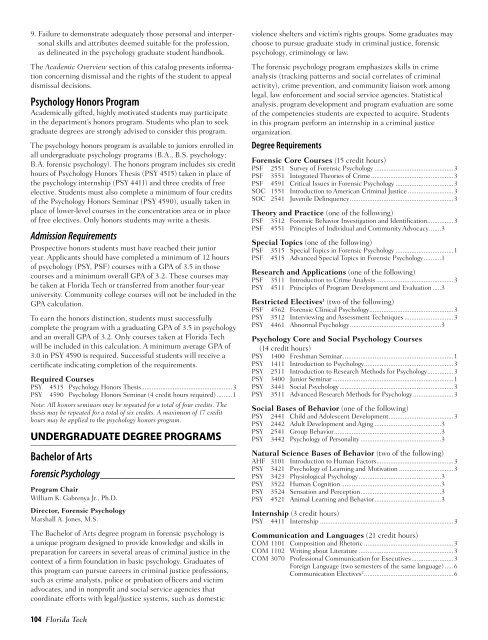2008–2009 - Florida Institute of Technology
2008–2009 - Florida Institute of Technology
2008–2009 - Florida Institute of Technology
You also want an ePaper? Increase the reach of your titles
YUMPU automatically turns print PDFs into web optimized ePapers that Google loves.
9. Failure to demonstrate adequately those personal and interpersonal<br />
skills and attributes deemed suitable for the pr<strong>of</strong>ession,<br />
as delineated in the psychology graduate student handbook.<br />
The Academic Overview section <strong>of</strong> this catalog presents information<br />
concerning dismissal and the rights <strong>of</strong> the student to appeal<br />
dismissal decisions.<br />
Psychology Honors Program<br />
Academically gifted, highly motivated students may participate<br />
in the department’s honors program. Students who plan to seek<br />
graduate degrees are strongly advised to consider this program.<br />
The psychology honors program is available to juniors enrolled in<br />
all undergraduate psychology programs (B.A., B.S. psychology;<br />
B.A. forensic psychology). The honors program includes six credit<br />
hours <strong>of</strong> Psychology Honors Thesis (PSY 4515) taken in place <strong>of</strong><br />
the psychology internship (PSY 4411) and three credits <strong>of</strong> free<br />
elective. Students must also complete a minimum <strong>of</strong> four credits<br />
<strong>of</strong> the Psychology Honors Seminar (PSY 4590), usually taken in<br />
place <strong>of</strong> lower-level courses in the concentration area or in place<br />
<strong>of</strong> free electives. Only honors students may write a thesis.<br />
Admission Requirements<br />
Prospective honors students must have reached their junior<br />
year. Applicants should have completed a minimum <strong>of</strong> 12 hours<br />
<strong>of</strong> psychology (PSY, PSF) courses with a GPA <strong>of</strong> 3.5 in those<br />
courses and a minimum overall GPA <strong>of</strong> 3.2. These courses may<br />
be taken at <strong>Florida</strong> Tech or transferred from another four-year<br />
university. Community college courses will not be included in the<br />
GPA calculation.<br />
To earn the honors distinction, students must successfully<br />
complete the program with a graduating GPA <strong>of</strong> 3.5 in psychology<br />
and an overall GPA <strong>of</strong> 3.2. Only courses taken at <strong>Florida</strong> Tech<br />
will be included in this calculation. A minimum average GPA <strong>of</strong><br />
3.0 in PSY 4590 is required. Successful students will receive a<br />
certificate indicating completion <strong>of</strong> the requirements.<br />
Required Courses<br />
PSY 4515 Psychology Honors Thesis ....................................................3<br />
PSY 4590 Psychology Honors Seminar (4 credit hours required) .........1<br />
Note: All honors seminars may be repeated for a total <strong>of</strong> four credits. The<br />
thesis may be repeated for a total <strong>of</strong> six credits. A maximum <strong>of</strong> 17 credit<br />
hours may be applied to the psychology honors program.<br />
unDergrADuATe Degree ProgrAmS<br />
Bachelor <strong>of</strong> Arts<br />
Forensic Psychology _________________________<br />
Program Chair<br />
William K. Gabrenya Jr., Ph.D.<br />
Director, Forensic Psychology<br />
Marshall A. Jones, M.S.<br />
The Bachelor <strong>of</strong> Arts degree program in forensic psychology is<br />
a unique program designed to provide knowledge and skills in<br />
preparation for careers in several areas <strong>of</strong> criminal justice in the<br />
context <strong>of</strong> a firm foundation in basic psychology. Graduates <strong>of</strong><br />
this program can pursue careers in criminal justice pr<strong>of</strong>essions,<br />
such as crime analysts, police or probation <strong>of</strong>ficers and victim<br />
advocates, and in nonpr<strong>of</strong>it and social service agencies that<br />
coordinate efforts with legal/justice systems, such as domestic<br />
104 <strong>Florida</strong> Tech<br />
violence shelters and victim’s rights groups. Some graduates may<br />
choose to pursue graduate study in criminal justice, forensic<br />
psychology, criminology or law.<br />
The forensic psychology program emphasizes skills in crime<br />
analysis (tracking patterns and social correlates <strong>of</strong> criminal<br />
activity), crime prevention, and community liaison work among<br />
legal, law enforcement and social service agencies. Statistical<br />
analysis, program development and program evaluation are some<br />
<strong>of</strong> the competencies students are expected to acquire. Students<br />
in this program perform an internship in a criminal justice<br />
organization.<br />
Degree Requirements<br />
Forensic Core Courses (15 credit hours)<br />
PSF 2551 Survey <strong>of</strong> Forensic Psychology .............................................3<br />
PSF 3551 Integrated Theories <strong>of</strong> Crime ...............................................3<br />
PSF 4591 Critical Issues in Forensic Psychology .................................3<br />
SOC 1551 Introduction to American Criminal Justice ..........................3<br />
SOC 2541 Juvenile Delinquency ...........................................................3<br />
Theory and Practice (one <strong>of</strong> the following)<br />
PSF 3512 Forensic Behavior Investigation and Identification ...............3<br />
PSF 4551 Principles <strong>of</strong> Individual and Community Advocacy .......3<br />
Special Topics (one <strong>of</strong> the following)<br />
PSF 3515 Special Topics in Forensic Psychology .................................1<br />
PSF 4515 Advanced Special Topics in Forensic Psychology ..........1<br />
Research and Applications (one <strong>of</strong> the following)<br />
PSF 3511 Introduction to Crime Analysis ............................................3<br />
PSY 4511 Principles <strong>of</strong> Program Development and Evaluation .....3<br />
Restricted Electives 1 (two <strong>of</strong> the following)<br />
PSF 4562 Forensic Clinical Psychology ................................................3<br />
PSY 3512 Interviewing and Assessment Techniques ............................3<br />
PSY 4461 Abnormal Psychology ....................................................3<br />
Psychology Core and Social Psychology Courses<br />
(14 credit hours)<br />
PSY 1400 Freshman Seminar ...............................................................1<br />
PSY 1411 Introduction to Psychology ...................................................3<br />
PSY 2511 Introduction to Research Methods for Psychology ...............3<br />
PSY 3400 Junior Seminar .....................................................................1<br />
PSY 3441 Social Psychology .................................................................3<br />
PSY 3511 Advanced Research Methods for Psychology .......................3<br />
Social Bases <strong>of</strong> Behavior (one <strong>of</strong> the following)<br />
PSY 2441 Child and Adolescent Development .....................................3<br />
PSY 2442 Adult Development and Aging ......................................3<br />
PSY 2541 Group Behavior .............................................................3<br />
PSY 3442 Psychology <strong>of</strong> Personality ..............................................3<br />
Natural Science Bases <strong>of</strong> Behavior (two <strong>of</strong> the following)<br />
AHF 3101 Introduction to Human Factors............................................3<br />
PSY 3421 Psychology <strong>of</strong> Learning and Motivation ...............................3<br />
PSY 3423 Physiological Psychology ...............................................3<br />
PSY 3522 Human Cognition .........................................................3<br />
PSY 3524 Sensation and Perception ..............................................3<br />
PSY 4521 Animal Learning and Behavior ......................................3<br />
Internship (3 credit hours)<br />
PSY 4411 Internship ............................................................................3<br />
Communication and Languages (21 credit hours)<br />
COM 1101 Composition and Rhetoric ...................................................3<br />
COM 1102 Writing about Literature ......................................................3<br />
COM 3070 Pr<strong>of</strong>essional Communication for Executives ........................3<br />
Foreign Language (two semesters <strong>of</strong> the same language) .....6<br />
Communication Electives 2 ...................................................6

















